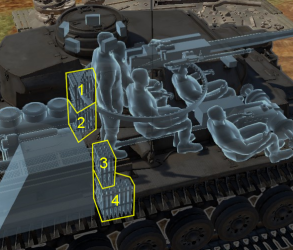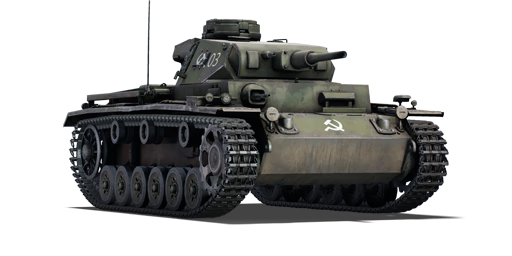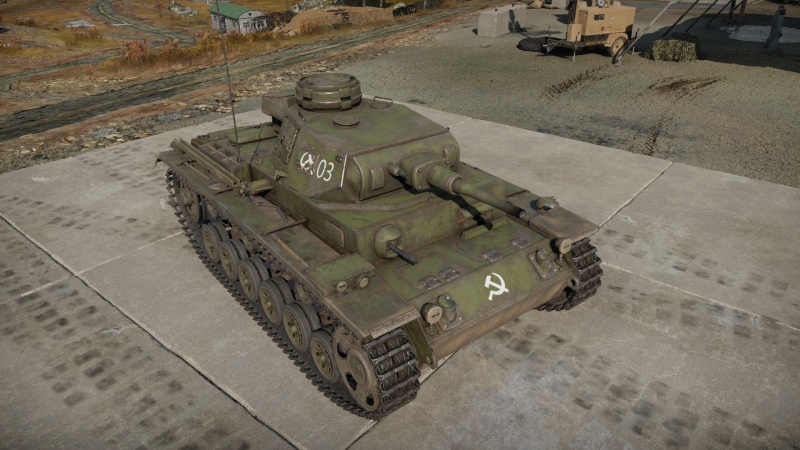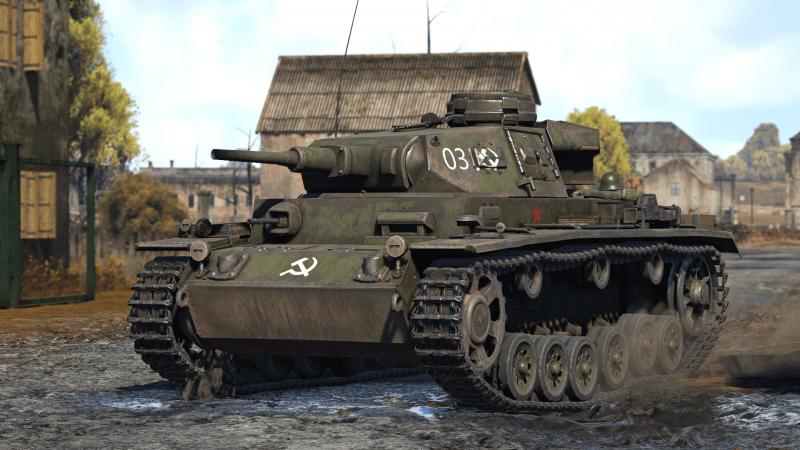T-III (USSR)
| This page is about the Soviet medium tank T-III (USSR). For the other captured medium tank, see T-V (USSR). |
Contents
Description
During the Polish campaign, Red Army soldiers found a damaged Pz.III tank, abandoned by its crew, which was secretly transported to the USSR and thoroughly studied. With the attack of Nazi Germany on the Soviet Union, Red Army soldiers began capturing other Pz.III tanks. These were then repaired and put into service with Soviet units under the designation T-III (Type-3). They were successfully used until 1943, when, due to insufficient penetration of the main gun and a limited supply of captured ammunition, they were withdrawn from service.
The Soviet T-III was introduced in Update 1.43. Being a copy of the German Pz.III J, it also boasts a powerful 50 mm gun, which allows it to engage even the most heavily armoured combat vehicles encountered in battles. Its decent mobility allows it to both keep up with light tanks, supporting them with fire, and to take up advantageous firing positions. One of the tank's key drawbacks is its mediocre survivability: the crew is compactly arranged, and the upper glacis plate and sides are easily penetrated. Therefore, for increased protection, the tank should be angled with a corner towards the enemy.
General info
Survivability and armour
Armour type:
- Rolled homogeneous armour
- Cast homogeneous armour (Barrel shroud, Cupola)
| Armour | Front | Sides | Rear | Roof |
|---|---|---|---|---|
| Hull | 50 mm (12°) Front plate 25 mm (86°), 50 mm (52°) Front glacis 50 mm (23-69°) Lower glacis |
30 mm | 50 mm (14-46°) Top 50 mm (10-66°) Bottom |
15 mm |
| Turret | 50 mm (10-25°) Turret front 50 mm (12-62°) Gun mantlet |
30 mm (20-25°) | 30 mm (12-15°) | 10 mm |
| Cupola | 50 mm | 50 mm | 50 mm | 10 mm |
Notes:
- Suspension wheels are 15 mm thick while tracks are 20 mm thick.
With only a vertical 50 mm armour plate at the front, even some rank I guns can penetrate the T-III's armour. Angling will not really help, as you will expose your even thinner side armour. However, the lower glacis is quite angled, and most small-calibre rounds will bounce off harmlessly. The ammunition is stored in the back of the tank, minimizing the threat of being ammo-racked.
Mobility
| Game Mode | Max Speed (km/h) | Weight (tons) | Engine power (horsepower) | Power-to-weight ratio (hp/ton) | |||
|---|---|---|---|---|---|---|---|
| Forward | Reverse | Stock | Upgraded | Stock | Upgraded | ||
| Arcade | 60 | 12 | 21.8 | 465 | 572 | 21.33 | 26.24 |
| Realistic | 54 | 10 | 265 | 300 | 12.16 | 13.76 | |
Modifications and economy
Armaments
Main armament
| 50 mm KwK L/42 | Turret rotation speed (°/s) | Reloading rate (seconds) | |||||||||||
|---|---|---|---|---|---|---|---|---|---|---|---|---|---|
| Mode | Capacity | Vertical | Horizontal | Stabilizer | Stock | Upgraded | Full | Expert | Aced | Stock | Full | Expert | Aced |
| Arcade | 99 | -10°/+20° | ±180° | - | 11.4 | 15.8 | 19.2 | 21.2 | 22.6 | 5.20 | 4.60 | 4.24 | 4.00 |
| Realistic | 7.1 | 8.4 | 10.2 | 11.3 | 12.0 | ||||||||
Ammunition
- PzGr 39 - APC - This is your main ammo type, use it whenever you think it has enough penetration to penetrate your target. It deals the most damage because of its explosive filler.
- PzGr 40 - APCR - this variation of APCR is lighter, slightly faster and offers the best penetration (up to 132 mm). Use it against heavily armoured beasts. However, don't expect it to cause any real damage upon penetration. It only deals damage to modules/crew straight in its path, due to the fact that it has no explosive filler.
| Penetration statistics | |||||||
|---|---|---|---|---|---|---|---|
| Ammunition | Type of warhead |
Penetration @ 0° Angle of Attack (mm) | |||||
| 10 m | 100 m | 500 m | 1,000 m | 1,500 m | 2,000 m | ||
| PzGr 39 | APC | 80 | 76 | 62 | 48 | 38 | 29 |
| PzGr 40 | APCR | 116 | 107 | 74 | 47 | 30 | 19 |
| Shell details | ||||||||||||
|---|---|---|---|---|---|---|---|---|---|---|---|---|
| Ammunition | Type of warhead |
Velocity (m/s) |
Projectile mass (kg) |
Fuse delay (m) |
Fuse sensitivity (mm) |
Explosive mass (TNT equivalent) (g) |
Ricochet | |||||
| 0% | 50% | 100% | ||||||||||
| PzGr 39 | APC | 685 | 2.05 | 1.2 | 9 | 28.9 | 48° | 63° | 71° | |||
| PzGr 40 | APCR | 1,050 | 0.9 | - | - | - | 66° | 70° | 72° | |||
Ammo racks

| Full ammo |
1st rack empty |
2nd rack empty |
3rd rack empty |
4th rack empty |
Visual discrepancy |
|---|---|---|---|---|---|
| 99 | 74 (+25) | 48 (+51) | 33 (+66) | 1 (+98) | No |
Notes:
- Racks disappear when all shells in the rack have been loaded/shot.
- Racks 1 to 3 emptied: 33 (+66) shells.
Machine guns
| 7.92 mm MG34 | ||||
|---|---|---|---|---|
| Mount | Capacity (Belt) | Fire rate | Vertical | Horizontal |
| Coaxial | 4,350 (150) | 900 | - | - |
Usage in battles
This tank is a captured Pz.III J, and plays similarly. While it does have significantly better armour on the front than its predecessor, the higher battle rating means it faces tougher, more well-armoured opposition in uptiers. The T-34 (1940) is almost impenetrable, except for some weak spots around the turret and flat-on below the tracks. M4A1s are similar in speed to you, have better sloped frontal armour that you cannot penetrate, more powerful guns, and stabilizers. APCR post-penetration damage is not sufficient enough to be counted upon when you need it the most, plus neither PzGr.40/1 or PzGr.40 can frontally penetrate a Sherman or T-34. The best way to attack these tanks is to flank them with your good mobility, or wait for them to overextend, then shoot at their weaker side armour. Furthermore, the high fuse sensitivity makes many lightly-armoured tank destroyers equipped with strong guns your worst nightmare, since you'll over-penetrate repeatedly in most cases, allowing easy return fire from the enemy. Enemy SPAAGs, in particular, are very dangerous because of your 15 mm turret ring weak spot, enabling them to spray all over you to incapacitate your gunner and loader.
Pros and cons
Pros:
- Accurate and decently powerful gun
- Good -10° gun depression
- Decent mobility
- APCR ammo has very high speed and good penetration, making shooting at long range easier
- Armour can reliably protect against low calibre guns
- Panzer III profile may trick some enemies into ignoring this vehicle
Cons:
- Relatively low armour penetration for regular ammunition
- Slow turret traverse speed
- Flat frontal armour and thin side armour
- Large commander's cupola can attract enemy fire
- Panzer III profile will attract friendly fire in Simulator mode
History
The T-III (USSR) is the Soviet designation for a captured Panzer III, which saw extensive service during the early phases of Operation Barbarossa. After the battle of Moscow, the Soviet army got a hold of lots of German equipment and it was subsequently evaluated. The T-III was mostly issued as a command vehicle due to its increased comfort and reliable radio. Often times captured vehicles would be refitted with Soviet parts for logistical reasons. It saw combat in the battles of Kursk, Leningrad and Stalingrad, earning themselves a great reputation. The T-III was operated by the Red Army until late 1943 after which they were dropped out of service in favour of newer Soviet vehicles or newly captured Panther tanks.
| Archive of the in-game description | |
|---|---|
|
The designation used for the captured Pz.Kpfw.lll German medium tank in the Red Army arsenal. The tank was an early modification of the Pz.Kpfw.lll Ausf.J that was armed with a short-barrel 50 mm KwK.38 L/42. The Ausf.J differed from previous modifications by its enlarged frontal body armour (50 mm) and certain mechanical changes. These tanks were popular with Soviet tank crews due to their excellent scopes, their loadout, and the convenience of the crew. | |
Media
- Skins
- Videos
See also
External links
Paste links to sources and external resources, such as:
- topic on the official game forum;
- other literature.
| USSR medium tanks | |
|---|---|
| T-28 | T-28 (1938) · T-28 · T-28E |
| T-34-76 | T-34 (Prototype) · T-34 (1940) · T-34 (1941) · T-34 (1st Gv.T.Br.) · T-34 (1942) · T-34E STZ · T-34E |
| T-34-57 | T-34-57 · T-34-57 (1943) |
| T-34-85 | T-34-85 (D-5T) · T-34-85 · T-34-85E |
| T-34-100 | T-34-100 |
| T-44 | T-44 · T-44-100 · T-44-122 |
| T-54 | T-54 (1947) · T-54 (1949) · T-54 (1951) |
| T-55 | TO-55 · T-55A · T-55AM-1 · T-55AMD-1 |
| T-62 | T-62 · T-62M-1 |
| T-64 | Object 435 · T-64A (1971) · T-64B |
| T-72 | T-72A · T-72AV (TURMS-T) · T-72B · T-72B (1989) · T-72B3 · T-72M2 Moderna |
| T-80 | T-80B · T-80U · T-80UD · T-80UK · T-80UM2 · Т-80U-Е1 · T-80BVM · Object 292 |
| T-90 | Т-90А · T-90M |
| Trophies/Lend-Lease | |
| Germany | ▂T-III · ▂T-V |
| Great Britain | ▂МК-IX "Valentine" |
| USA | ▂M3 Medium · ▂M4A2 |
| USSR premium ground vehicles | |
|---|---|
| Light tanks | BA-11 · RBT-5 · BT-7A (F-32) · T-26 (1st Gv.T.Br.) · T-26E · T-126 · PT-76-57 · 2S38 |
| Medium tanks | T-34 (Prototype) · T-34 (1st Gv.T.Br.) · T-34E · T-34-57 (1943) · T-34-85E · T-34-100 · T-44-122 · TO-55 · T-55AM-1 · T-72AV (TURMS-T) · T-80UD · Т-80U-Е1 |
| ▂M3 Medium · ▂M4A2 · ▂T-III · ▂T-V · ▂МК-IX "Valentine" | |
| Heavy tanks | SMK · T-35 · ▂MK-II "Matilda" · KV-1E · KV-2 (1940) · KV-2 (ZiS-6) · KV-122 · KV-220 · IS-2 "Revenge" · Object 248 · IS-6 · T-10A |
| Tank destroyers | BM-8-24 · BM-13N · BM-31-12 |
| SU-57 · SU-76D · SU-76M (5th Gv.Kav.Corps) · SU-85A · SU-100Y · SU-122P · Object 120 | |
| SPAA | ▂Phòng không T-34 · ZUT-37 |






